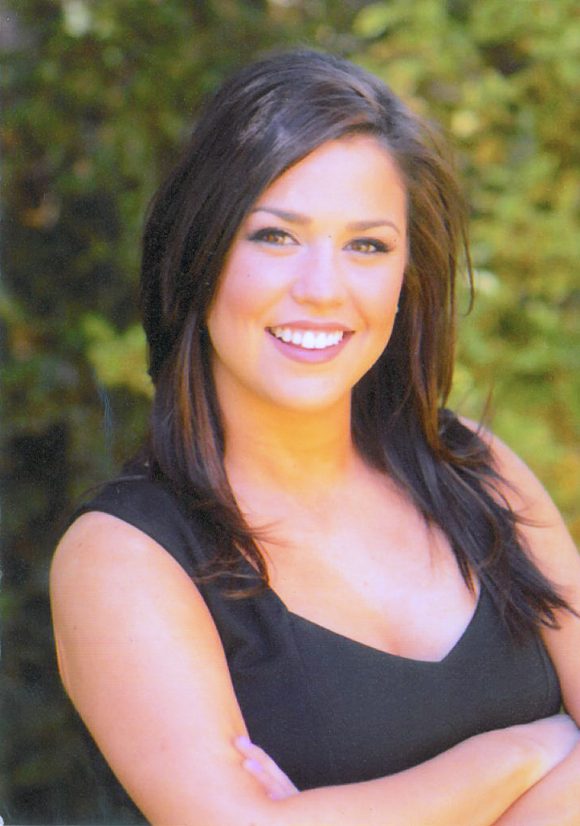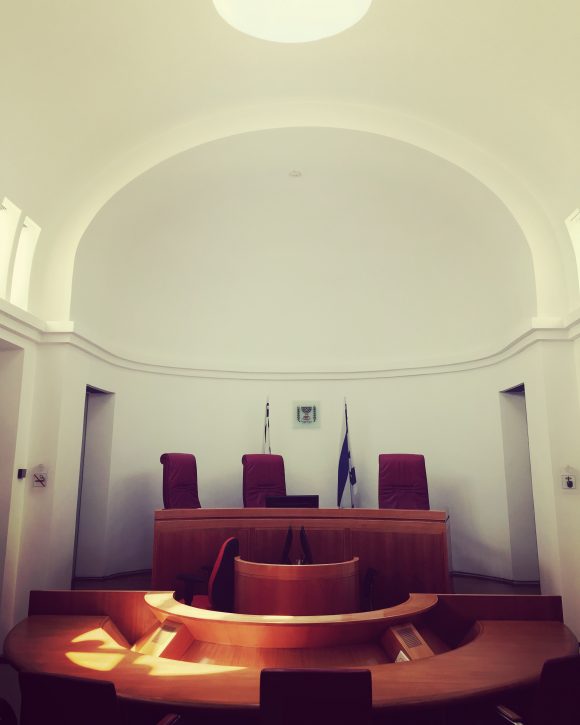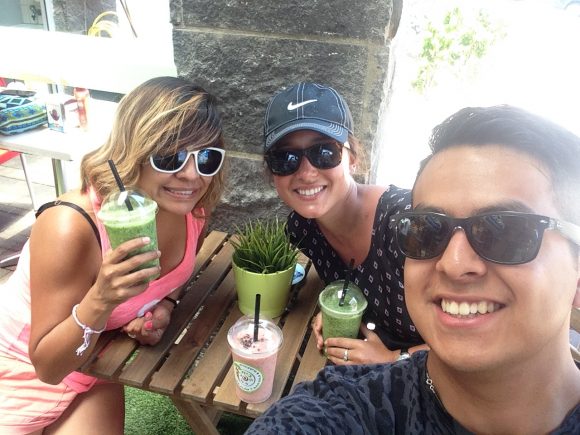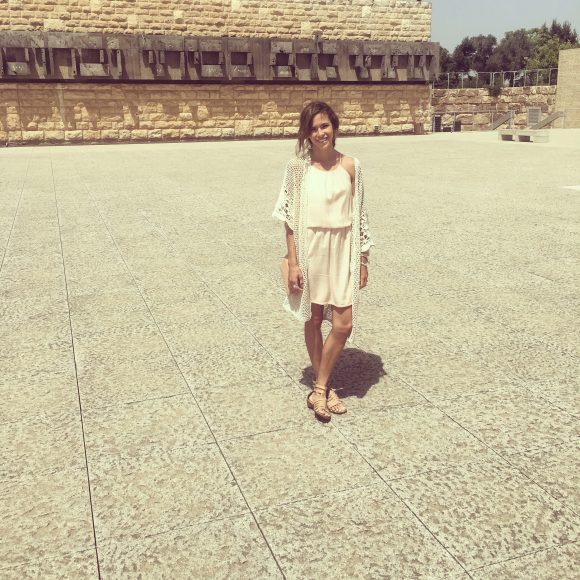Each year we eagerly welcome a new class of Fowler School of Law alumni to our ranks. Although they may leave Kennedy Hall to pursue their unique career paths after graduation, they remain an integral part of the Fowler School of Law community – the very thing that draws so many to the school. This year, we invited some of our graduating students to share their Fowler School of Law experience with us. Below are a just a few of the many stories of Fowler School of Law’s class of 2016.
April Cristal
![April Cristal]()
April Cristal
To April Cristal, a strong sense of community was crucial when it came down to choosing her future law school out of the 40 she applied to. After taking into consideration the usual checklist of academic rankings and student resources of her top picks, she took it upon herself to find out what student life was actually like. After each campus tour, she stopped in the student lounge to sit and observe how students interacted with one another, and how faculty and administrators interacted with students outside of the classroom. She wanted a positive environment, not the dreaded law school cliché of catty classmates.
“Chapman, of all the schools I visited, felt the most welcoming,” she said. “I sat in the student lounge for a bit and I could just tell that the students were friendly. They were making plans for social events and talking about the readings. I thought it was just a good environment to be in.”
Once she started law school, her hunch proved true. Although every student strives to be better, she said, they’re competing alongside of each other rather than against.
“By nature, as a law student we have to be competitive,” she said. “But I’ve never felt that people were trying to sabotage me or make me do worse in a class. If I missed a class, at least one person every time would text me to ask if I was OK, or if I needed the notes. So it’s a nice place to be, because law school is already stressful. You may as well have a good support system.”
Over her three years at Fowler School of Law, Cristal served as an executive board member on the Public Interest Law Foundation (PILF), Asian Pacific American Law Students Association (APALSA), Student Bar Association (SBA) and as a co-chair for the Graduate Student Council. She also participated in the Children and Family Law Society, the Diversity Initiative Publication and Symposium, the Careers Services Office Advisory Board and as a student ambassador.
“I looked at law school as a very finite amount of time,” she said. “I came into law school thinking, if you really want to do something then go for it and do it as soon as you can, because you might not get the opportunity ever again. There are only three years to fit it all in.”
Cristal said that although she entered planning to pursue educational law, her plans shifted after networking with attorneys and exploring externships and internships with organizations such as the Office of County Council, Children’s Law Center and judicial externships in the Federal District Court. Now, she is pursuing judicial clerkships and considering pursuing local government attorney positions.
“I came into law school wanting to serve people and really make an impact in the lives of individuals and communities, and I think being a local government attorney can do that,” she said. “I had never really thought about how much impact the city or county had on people’s lives until I interned for a county council.”
Cristal said her inspiration to pursue the law came from her time as a middle school teacher in San Francisco as well as her own experiences as an Asian-American woman.
“Working with the community in San Francisco made me realize that we definitely need to build more diversity. It sounds cheesy, but I thought about what I wanted to the world to like in the future,” she said. “At the time, a lot of my friends were becoming professors, or nurses or teachers — which is great — but I didn’t see a lot of people with my same background becoming lawyers. Once I started law school, I found a lot of those people.”
The highlight of her law career, she said, came at the close of her final semester when after two years of working toward building a social justice publication with a number of other students, she received an email from the faculty committee approving the proposal.
“It was a really nice beginning to the end of my law school career,” she said. “I’ve been working on it for the last two years with a lot of great people and it’s nice to see it come to fruition.”
Jonathan Shin
![IMG_5945 Post]()
Jonathan Shin
One of the most common pieces of advice to law students is to “make the most” of the three short years they have in law school. Jonathan Shin took that advice seriously, taking on an immigration case as a student under the guidance of Professor Richard Green. After three years of litigation, Shin won the case in September, saving his client from being permanently removed from the country and separated from his family.
“Seeing his family hug while jumping up and down in the court room, was a significant moment in my law school career,” he said. “It gave a meaning and purpose to my education.”
Aside from his very practical training with Professor Green, Shin found himself involved in several on-campus organizations including founding the Korean American Law Students Association (KALSA), serving on the executive boards of SBA, the Business Investment Law Society, and serving as a Big Sibling for the law school and APALSA. He was also a member of the Moot Court and Alternative Dispute Resolution competition teams, and served as on the Career Services Office Advisory Board and as an Honor Council Advocate.
The opportunities to participate and help build a strong community proved true to his original feelings about the school.
“The thing that stuck out to me when picking Fowler School of Law was the high bar passage rate, the low faculty to student ratio, and the shared sense of community within the student body. While law schools are notorious for their competitive environments, our student body truly thrives off of supporting each other,” he said.
Although he has received offers following graduation — which also include staying at his current firm, Stephens and Friedland, where he clerked for his 3L year — he has yet to make any final decisions.
Jessica Roundy
![Jessica6]()
Jessica Roundy
Jessica Roundy began law school with aspirations she calls corny but true: to fight for justice.
“I wanted to give a voice to those don’t have one,” she said.
After graduation, she’ll be heading to the Riverside County District Attorney’s Office, where she has interned for the last three summers and will become a Deputy DA after passing the bar.
For her, like many, Fowler School of Law was a home. As a California native, she had plans to move to a big city or the east coast, something different, she said, until she visited Fowler School of Law.
“I felt it when I walked in, but even more so when I saw the students interacting. I could just feel that the community here was so much different from anywhere else,” she said. “We have a great group of people here. Not only the students but the faculty and administration; we have people who care about and support one another, and at the same time challenge them to be better, individually and collectively.”
As part of that community, Roundy spent her years involved in student organizations such as SBA, the Nexus Journal, the Fowler School of Law Grad Committee and Honor Council. She also found herself as a research assistant, academic fellow, student ambassador and Big Sibling for the law school.
Between summers spent interning with the Riverside District Attorney’s Office and two semesters interning for the Orange County District Attorney’s Office, she also participated in the Fowler School of Law Mock Trial and Moot Court competition teams.
“The opportunity to go out and compete against different teams and schools, and to dive in head first into the courtroom was my favorite experience of law school,” she said. “When I stepped into the courtroom for the first time in my second year, I just felt so much more prepared. I knew where to stand and how to speak. There were certainly things I didn’t know yet, and still have to learn, but having that experience definitely helped me get over the smaller lessons so I can learn the more important ones.”
Although her ultimate goal to pursue a career with the District Attorney’s Office has remained the same throughout her three years at Fowler School of Law, she said law school, and the opportunities to build upon her classroom experiences through on-campus organizations, has changed her for the better.
“I think I’m a completely different person now than who I was when I started. The way I look at the world, the way I think and look at problems has changed so much through this education,” she said. “I think that’s really what law school provides you with. It’s such a versatile degree that it gives you the tools to see the world and help you solve problems in a way you never did before.”
And when it comes to providing advice to new students, her answer comes down to simply taking the leap to make the most of the experience.
“Dive in head first. Take up every opportunity that you can or that you’re interested in, and soak up all that these three years can provide,” she said. “Don’t get me wrong, there are times when it’s tough, but thinking back on the last three years, it’s all worth it. I wouldn’t go back and change anything.”
If you think your or someone you know should be featured on the Chapman Law blog, let us know!




 This short essay was written for the Touro Law Review’s Associate Dean’s Symposium on “Student-Edited Law Reviews: Future Publication Platforms.” It maintains that the Associate Dean for Research has a responsibility to shape and develop the scholarly culture and intellectual life of the law school. Part of that charge should be to aid the student-edited law reviews in their contribution to that enterprise and to help those reviews evolve. In addition to their pedagogical value for the students (developing editing, reasoning, research, and writing skills), these reviews play a part in sending signals to the outside world of the scholarly commitment of a law school. And, most importantly, student-edited law reviews serve the higher value of distributing knowledge and disseminating legal thought that addresses doctrinal clarity, unpacks theoretical uncertainties, creates foundations for reform, or otherwise presents legal solutions to critical social issues.
This short essay was written for the Touro Law Review’s Associate Dean’s Symposium on “Student-Edited Law Reviews: Future Publication Platforms.” It maintains that the Associate Dean for Research has a responsibility to shape and develop the scholarly culture and intellectual life of the law school. Part of that charge should be to aid the student-edited law reviews in their contribution to that enterprise and to help those reviews evolve. In addition to their pedagogical value for the students (developing editing, reasoning, research, and writing skills), these reviews play a part in sending signals to the outside world of the scholarly commitment of a law school. And, most importantly, student-edited law reviews serve the higher value of distributing knowledge and disseminating legal thought that addresses doctrinal clarity, unpacks theoretical uncertainties, creates foundations for reform, or otherwise presents legal solutions to critical social issues.


 Earlier in the day, LL.M. graduates met in Kennedy Hall for a private reception recognizing their accomplishments, prior to the official commencement ceremony on Friday. Graduating students Rahil Attawala, Chinweike Peter Ezike, Oghenetuvie Loveth Omasheye and Sonya Jifkins served as class speakers, thanking their families, Fowler School of Law faculty and fellow graduates for their support and help in reaching their goal.
Earlier in the day, LL.M. graduates met in Kennedy Hall for a private reception recognizing their accomplishments, prior to the official commencement ceremony on Friday. Graduating students Rahil Attawala, Chinweike Peter Ezike, Oghenetuvie Loveth Omasheye and Sonya Jifkins served as class speakers, thanking their families, Fowler School of Law faculty and fellow graduates for their support and help in reaching their goal. 



 Proponents of legislative patent reform argue that the current patent system perversely impedes true innovation in the name of protecting a vast web of patented inventions, the majority of which are never even commercialized for the benefit of the public. Opponents of such legislation argue that comprehensive, prospective patent reform legislation would harm the incentive to innovate more than it would curb the vexatious practices of non-practicing entities. But while the “Innovation Act” wallows in Congress, there is a common law tool to protect innovation from the patent thicket lying right under our noses: the reverse doctrine of equivalents. Properly applied, this judge-made doctrine can be used to excuse infringement on a case-by-case basis if the court determines that the accused product is substantially superior to the patented invention, despite proof of literal infringement. Unfortunately, the reverse doctrine is disfavored by the Court of Appeals for the Federal Circuit and therefore rarely applied. It was not always so. This article is the first comprehensive study of published opinions applying the reverse doctrine of equivalents to excuse infringement between 1898, when the Supreme Court established the doctrine, and the 1982 creation of the Federal Circuit. This “lost precedent” reveals a flexible doctrine that takes into account the technological and commercial superiority of the accused product to any embodiment of the patented invention made by the patent-holder. An invigorated reverse doctrine of equivalents could therefore serve to protect true innovations from uncommercialized patents on a case-by-case basis, without the potential harm to the innovation incentive that prospective patent legislation might cause.
Proponents of legislative patent reform argue that the current patent system perversely impedes true innovation in the name of protecting a vast web of patented inventions, the majority of which are never even commercialized for the benefit of the public. Opponents of such legislation argue that comprehensive, prospective patent reform legislation would harm the incentive to innovate more than it would curb the vexatious practices of non-practicing entities. But while the “Innovation Act” wallows in Congress, there is a common law tool to protect innovation from the patent thicket lying right under our noses: the reverse doctrine of equivalents. Properly applied, this judge-made doctrine can be used to excuse infringement on a case-by-case basis if the court determines that the accused product is substantially superior to the patented invention, despite proof of literal infringement. Unfortunately, the reverse doctrine is disfavored by the Court of Appeals for the Federal Circuit and therefore rarely applied. It was not always so. This article is the first comprehensive study of published opinions applying the reverse doctrine of equivalents to excuse infringement between 1898, when the Supreme Court established the doctrine, and the 1982 creation of the Federal Circuit. This “lost precedent” reveals a flexible doctrine that takes into account the technological and commercial superiority of the accused product to any embodiment of the patented invention made by the patent-holder. An invigorated reverse doctrine of equivalents could therefore serve to protect true innovations from uncommercialized patents on a case-by-case basis, without the potential harm to the innovation incentive that prospective patent legislation might cause. In his testimony, Professor Eggert offered examples of ways that “professional” fantasy sports players can prey on recreational players by creating a perfect winning lineup using complex algorithms to predict any number of factors. To combat this, he suggested higher regulation of the industry including limiting the number of fantasy lineups that any player can enter, labeling high earners so that recreational players know what caliber of player they are up against, providing services to gambling addicts, preventing insider playing and adding regulators to oversee games.
In his testimony, Professor Eggert offered examples of ways that “professional” fantasy sports players can prey on recreational players by creating a perfect winning lineup using complex algorithms to predict any number of factors. To combat this, he suggested higher regulation of the industry including limiting the number of fantasy lineups that any player can enter, labeling high earners so that recreational players know what caliber of player they are up against, providing services to gambling addicts, preventing insider playing and adding regulators to oversee games. 
 Even though effective evidence-based juvenile offender rehabilitation programs have been available for twenty years, such programs are underutilized and frequently misperceived as too ineffective, costly, and lenient because they fail to satisfy society’s retributive need to punish offenders. But the public, policy makers, prosecutors, and judges will support and utilize evidence-based programs when apparent conflicts between the demand for evidence-based programs, concerns about program effectiveness and costs, and the felt need for punishment are reconciled. This chapter outlines how this can be accomplished by using evidence-based persuasion strategies to effectively communicate the compatibility of these three goals.
Even though effective evidence-based juvenile offender rehabilitation programs have been available for twenty years, such programs are underutilized and frequently misperceived as too ineffective, costly, and lenient because they fail to satisfy society’s retributive need to punish offenders. But the public, policy makers, prosecutors, and judges will support and utilize evidence-based programs when apparent conflicts between the demand for evidence-based programs, concerns about program effectiveness and costs, and the felt need for punishment are reconciled. This chapter outlines how this can be accomplished by using evidence-based persuasion strategies to effectively communicate the compatibility of these three goals.



 Parekh’s book,
Parekh’s book, 
 The story behind the move toward marijuana’s legality is a story of disruptive forces to the incumbent legal and physical landscape. It affects incumbent markets, incumbent places, the incumbent regulatory structure, and the legal system in general which must mediate the battles involving the push for relaxation of illegality and adaptation to accepting new marijuana-related land uses, against efforts toward entrenchment, resilience, and resistance to that disruption.
The story behind the move toward marijuana’s legality is a story of disruptive forces to the incumbent legal and physical landscape. It affects incumbent markets, incumbent places, the incumbent regulatory structure, and the legal system in general which must mediate the battles involving the push for relaxation of illegality and adaptation to accepting new marijuana-related land uses, against efforts toward entrenchment, resilience, and resistance to that disruption. As a second-year student planning on a future in litigation, Gabrielle LaCarre (JD ’17) knew a judicial externship was not the most traditional route. But rather than pursue work at a private law firm, she opted for a chance to see things from the other side of the bench through an externship at the Orange County Superior Court, where she found her passion outside of her comfort zone.
As a second-year student planning on a future in litigation, Gabrielle LaCarre (JD ’17) knew a judicial externship was not the most traditional route. But rather than pursue work at a private law firm, she opted for a chance to see things from the other side of the bench through an externship at the Orange County Superior Court, where she found her passion outside of her comfort zone.


 The law governing police interrogation provides perverse incentives. For criminal suspects, the law rewards obstruction and concealment. For police officers, it honors deceit and psychological aggression. For the courts and the rest of us, it encourages blindness and rationalization. This Article contends that the law could help foster better behaviors. The law could incentivize criminals to confess without police trickery and oppression. It could motivate police officers involved in obtaining suspect statements to avoid chicanery and duress. And, it could summon courts and the rest of us to speak more truthfully about whether suspect admissions are the product of informed, intelligent, and voluntary decisions. States could promote these outcomes by providing valuable sentencing concessions to those who confess.
The law governing police interrogation provides perverse incentives. For criminal suspects, the law rewards obstruction and concealment. For police officers, it honors deceit and psychological aggression. For the courts and the rest of us, it encourages blindness and rationalization. This Article contends that the law could help foster better behaviors. The law could incentivize criminals to confess without police trickery and oppression. It could motivate police officers involved in obtaining suspect statements to avoid chicanery and duress. And, it could summon courts and the rest of us to speak more truthfully about whether suspect admissions are the product of informed, intelligent, and voluntary decisions. States could promote these outcomes by providing valuable sentencing concessions to those who confess.